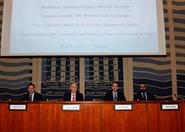Date : 08/05/2017

KUWAIT, May 8 (KUNA) -- A number of international financial experts stressed on the need on Monday for fiscal reforms to a number of Arab countries so as to address budget deficit caused recently by low oil prices and political unrests in some countries.
The IMF Middle East Center for Economics and Finance (CEF), jointly with the Arab Fund for Economic and Social Development, held a symposium that discussed the economic and social implications of fiscal reforms in Kuwait and the Arab world.
CEF's Director Oussama Kanaan said that the symposium, which was the sixth high-level forum organized by the CEF jointly with the AFESD, aimed at stimulating discussion on emerging regional and global issues that are of special interest to the public and policymakers in Kuwait and the wider Arab community.
He argued that the topic of fiscal reform has become increasingly important for a number of Arab countries, especially given rising pressures due to heightened conflict, a migration and refugee crisis, and, especially for GCC countries, low oil prices.
A common challenge for most countries in the region has been the design and implementation of prudent fiscal policies with socially desirable patterns of public expenditures and efficient tax systems that are conducive to inclusive, equitable economic growth, he added.
Meanwhile, Stephane Roudet, who leads the yearly IMF mission that appraises Kuwait's economic situation (the IMF Article IV Consultation mission), focused his remarks on the need for fiscal reforms in Kuwait.
He started by highlighting the new environment in which GCC countries operate, that is characterized by durably lower oil prices and a deterioration in fiscal positions.
Against this backdrop, Roudet explained why fiscal reforms are necessary in Kuwait, highlighting three broad objectives.
He noted that reforms should aim at gradually reducing the government deficit and financing needs, while creating room for growth-enhancing investment over the medium term.
He stressed the need to ensure that Kuwait continues saving a sufficient part of its oil wealth for future generations.
He explained that delinking government expenditure from volatile oil revenue would help maintain macroeconomic stability.
Roudet also flagged several spending areas where potential fiscal and efficiency gains are large, including the wage bill as well as subsidies and transfers.
He pointed out that a public wage reform that allows for flexibility in setting wage increases would be important to better control future wage growth, welcoming the important steps taken by the government over the past year to raise gasoline and utility prices and encouraged further rationalization of energy subsidies, which benefit the wealthy more than the less well-to-do and reduce energy efficiency.
Eric Le Borgne, Practice Manager for the Middle East and North Africa in the Macroeconomics and Fiscal management Global Practice of the World Bank, referred to significant steps taken in many countries toward consolidating spending, rolling back subsidies, and strengthening fiscal management.
He added that, mostly, fiscal policies in MENA countries still largely reflect an implicit "social contract" between governments and citizens, stating that this is evident among oil importers and oil producers alike, where fiscal policy is directed towards consumption spending, generous subsidies and large public sector workforce.
He said this has affected fiscal sustainability, limited the amount of fiscal resources available for growth enhancing expenditures, and also created major distortions. Public investment is low, compared to current government spending. Some GCC countries spend on infrastructure, but here the problem is of excess, and low value-for-money spending.
Chadi Abdallah, an IMF economist and expert, discussed the recent experience with energy subsidy reforms of countries in the group that includes the Middle East, North Africa, Afghanistan and Pakistan (MENAP).
He said many MENAP countries have recently taken important steps towards reducing energy price subsidies, noting that most MENAP countries still have not adopted automatic pricing mechanisms for fuel products, potentially making ad-hoc price increases unsustainable.
He explained in most MENAP countries, the energy price setting mechanisms have not yet been depoliticized, except in Oman, the UAE, and Jordan where recently there has been a switch to automatic pricing formulas for fuel products, or in Lebanon and Morocco where market-based pricing mechanisms have been adopted.
Overall ad-hoc price increases that are not accompanied by deeper reform measures are not sustainable.
He emphasized that, looking forward, a successful strategy is urgently needed and should build on a clear communication strategy, a depoliticization of the price setting process, and a proper compensation for vulnerable groups that will potentially be affected by the reform.
Abdallah indicated that estimates suggest that the GCC countries could generate permanent real income gains of up to 1.4 percent of GDP if domestic energy prices are increased to reflect cost recovery levels, with the gains being even much larger if savings were invested. (end)
nfk.fsh.hm